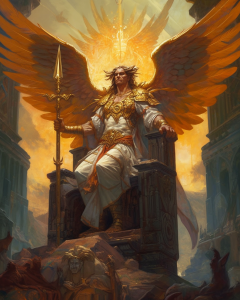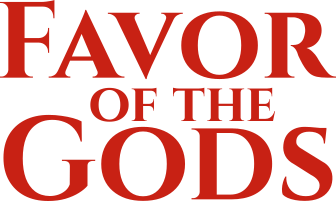Table of Contents
Wiktarism

Wiktar is the supreme ruler over heaven and earth. He commands the eleven archangels and the heavenly host. The antagonist of Wiktar is an evil and powerful demon named Saiffelbrandt who tempts the mortals and leads them into madness and despair with his foul bargains.
Worshippers of Wiktar who have distinguished themselves by great pious deeds in their lifetime enter the divine realm and stand by his side. There are many of these saints and they are often prayed to for specific blessings. The main deity of the related Kosmionic religion, the ascended Epyreion, is also considered a saint in Wiktarism.
During the time of the great empire of Niram, the capitol Nirammur was threatened by an invading horde from the steppes. In a vision, the emperor Lammisar IX. was promised celestial aid if he accepted Wiktar as his one and true god. Lammisar proclaimed his conversion the next day and ordered the soldiers to paint the sign of Wiktar on their shields. When the battle began, angels descended from the heavens and struck fear into the hearts of the tribesmen who fled the field and abandoned their raid. This event marked the year 1 of the Lammisarean calendar.
The Archangels
- Apyrim, oracle of paradise
- Auraion, keeper of the word
- Beluon, exalted general
- Istar, protector of the pious
- Kamural, guardian of the gate
- Leghtar, architect of heaven
- Maratar, heaven's sentinel
- Rasalion, harbinger of divinity
- Serate, healer of the host
- Tumarel, persecutor of evil
- Tsehat, keeper of the garden
The Eternal Enemy
Saiffelbrandt is known as the old man, the prince of madness and the deceiver. He is the great adversary, the enemy of the righteous and pious. Wiktarism teaches that Saiffelbrandt is the original demon, the first or his kind to walk the earth. It was him who taught demonology to the mortals. As punishment for this evil deed, he was imprisoned by Wiktar himself.
Since then, the black mountain Saiffur - also known as the source of madness - is Saiffelbrandt's home. From there he looks for weakness in the hearts of mortals. Those who listen to his deceptions lose their sleep and their sanity; they journey to the mountain, never to be seen again.
Only demons and mad folk associate with the old man. Some of the Korrgai warbands carry his banners, murdering and pillaging in his name. More than a few cults of Saiffelbrandt have been purged by the inquisition's zealous warriors, but they take root again and again. They seem to spread with the plague itself.
Heleukism: Wiktarism Reformed
During the great plague, the prophet Tsor Heleukim arrived in Nirammur and travelled further into the heartland of Wiktarism. He claimed that he had found the truth in the desert; he claimed that Wiktar is not a god, but an archangel, and that there is yet another higher power by the name of Im-Rhun, loving and wise, who once determined the fate of all. However, this true god is absent from this world and can only be returned when all the archangels work together. This also includes the fallen archangel Farael - also known as Saiffelbrandt - and another unknown archangel who is missing from paradise, making it a total of thirteen.
This heresy was not only joined by many among the discontent peasantry, but also some of the nobles. They were either convinced by the prophet or used his message as an excuse to seize power. Now the Heleukists strive to establish a new church for themselves.
S’taura-Wiktarism
When the horselords finally conquered Nirammur and founded the empire of Daiko-Niram, more and more parts of their religion were gradually accepted by the populace, resulting in S'taura-Wiktarism. The followers of this religion believe that Wiktar and Kara rule the heavens together as order and chaos. Their marriage preserves the balance of the world.
Wiktar Forryge
When the missionaries of Wiktar arrived on the island Forryge, their teachings were incorporated by the local druids. They still perform their many mystic rituals, but they have accepted Wiktar as the prime deity because of his strength. They believe that all immortals are in a continuous struggle for power where the mighty must rule the weak. The mortals are wise to worship those who can protect them from the others.
